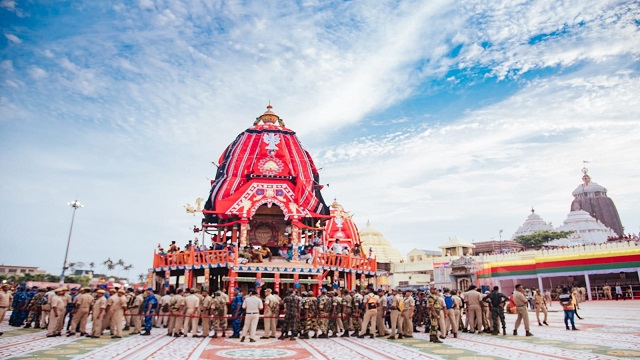


The annual Jagannath Rath Yatra in Odisha's Puri began on Sunday and top leaders including President Droupadi Murmu, PM Narendra Modi, Vice President Jagdeep Dhankhar, and West Bengal CM Mamata Banerjee extended their best wishes to the nation on this auspicious occasion. The President prayed for everyone's happiness and prosperity while the PM and Vice President sought blessings from Mahaprabhu Jagannath. The Chief Minister also promised to commence Rath Yatra from the newly built Jagannath Dham in Digha next year.
Rath Yatra: A Divine Journey of Lord Jagannath
Every year, the holy city of Puri in Odisha becomes the epicenter of an unparalleled religious spectacle: the Jagannath Rath Yatra. This grand festival marks the annual journey of Lord Jagannath, his brother Balabhadra, and sister Subhadra from their abode in the Jagannath Temple to the Gundicha Temple.
Historical Background:
The origins of the Rath Yatra can be traced back to the 12th century. Legend has it that Lord Jagannath was invited by King Indradyumna to Puri after revealing his divine form to the King. As a symbol of this invitation, the King built the Jagannath Temple and organized the first Rath Yatra.
Over the centuries, the Rath Yatra has become an integral part of Odia culture and is celebrated with great fervor and devotion. It has also been recognized by UNESCO as an Intangible Cultural Heritage of Humanity.
The Grand Procession:
The Rath Yatra begins on the day of Ashadha Shukla Paksha Dwitiya (usually in June or July). On this day, the three deities are ceremonially bathed and adorned with elaborate costumes and jewelry. They are then placed in three colossal wooden chariots, each pulled by thousands of devotees.
The chariots, known as Nandighosha (Lord Jagannath), Taladhwaja (Lord Balabhadra), and Darpadalana (Goddess Subhadra), are beautifully decorated with intricate carvings and colorful fabrics. The procession proceeds from the Jagannath Temple to the Gundicha Temple, a distance of approximately 3 kilometers.
Religious Significance:
The Rath Yatra symbolizes the journey of the soul towards liberation. Lord Jagannath represents the soul, Balabhadra represents the mind, and Subhadra represents the physical body. The journey to the Gundicha Temple signifies the departure of the soul from the body and its pilgrimage towards enlightenment.
During the Rath Yatra, devotees believe that Lord Jagannath comes out of the temple to bless his devotees. They seek his blessings for happiness, prosperity, and liberation from the cycle of birth and death.
Recent Celebrations and Wishes:
This year's Rath Yatra commenced on July 1, 2023. Top leaders, including President Droupadi Murmu, Prime Minister Narendra Modi, Vice President Jagdeep Dhankhar, and West Bengal Chief Minister Mamata Banerjee, extended their best wishes to the nation on this auspicious occasion.
Top 5 FAQs:
The Rath Yatra takes place in Puri, Odisha, every year on the day of Ashadha Shukla Paksha Dwitiya (usually in June or July).
The Rath Yatra symbolizes the journey of the soul towards liberation and represents the departure of the soul from the body and its pilgrimage towards enlightenment.
Three chariots are used in the Rath Yatra: Nandighosha (Lord Jagannath), Taladhwaja (Lord Balabhadra), and Darpadalana (Goddess Subhadra).
The distance between the Jagannath Temple and the Gundicha Temple is approximately 3 kilometers.
Pulling the chariots during the Rath Yatra is believed to bring good luck and is considered an act of devotion to Lord Jagannath.

Pakistan's Prime Minister, Shehbaz Sharif, caused a major stir in Turkmenistan when he decided to gate-crash a meeting between Russian President Vladimir Putin and Turkish President Recep Tayyip Erdogan after waiting for 40 minutes. This impulsive move showcases Pakistan's increasing diplomatic insecurity and diminishing geopolitical clout. As Sharif struggles to secure meaningful engagements with major powers, he also faces domestic crises and is under the control of Army Chief Asim Munir. Meanwhile, the event in Turkmenistan marked a milestone for the country's declaration of neutrality and its efforts to maintain independence from both Western and Russian influence.

During an international forum in Turkmenistan, Pakistan's Prime Minister Shehbaz Sharif faced an embarrassing diplomatic moment as he walked into a private meeting between Russian President Vladimir Putin and Turkish President Recep Tayyip Erdogan. Sharif had been waiting for over 40 minutes for his scheduled meeting with Putin, causing him to enter the ongoing conversation between the two leaders. The incident, captured on video and shared by RT India, has triggered widespread mockery on social media with users making jokes about Sharif's actions. This comes as Pakistan attempts to strengthen its ties with Russia, while Putin maintains a closer relationship with India.

The latest bout of border fighting between Thailand and Cambodia has escalated, with hundreds of thousands of civilians displaced and casualties on both sides. The renewed skirmishes have shattered a ceasefire proposed by U.S. President Donald Trump in July. The leaders of both countries have promised to continue their aggressive stance, causing further tension and concerns for the safety of civilians. This has even resulted in the withdrawal of Cambodia's team from a regional sporting event.

Notorious Naxalite commander Ramdher Majji, along with his group, surrendered to the police in Chhattisgarh. This surrender marks a milestone in the fight against Naxalism, as the state's Deputy Chief Minister states that 80 percent of the menace has been eradicated. With the government's resolved aim to eliminate Naxalism by 2026, the country is heading towards a permanent solution to this long-standing issue. Home Minister Amit Shah also noted the significant progress made in reducing Naxal violence, with only 10 percent of the nation's population currently affected compared to 120 million people in the past.

After the tragic fire at their club in Goa, owners Gaurav and Saurabh Luthra have been detained in Thailand and are expected to be brought back to India soon. The Indian agencies have been in constant communication with Thai authorities and have managed to locate the brothers outside the main city area. With their detention, the process for their deportation has been initiated and Indian agencies are coordinating with Thai authorities for their return. The article also explains the general procedure for deportation of foreigners from Thailand under immigration laws.

Two years after the shocking death of Dawn Sturgess from Novichok poisoning, a public inquiry has released its final report. The report, overseen by retired Supreme Court justice Lord Hughes of Ombersley, examined whether British officials had taken adequate precautions to prevent the attack on ex-spy Sergei Skripal and his daughter Yulia in March 2018. The inquiry also investigated whether Ms. Sturgess's death could have been avoided with timely public warnings about abandoned objects. Good Morning Britain correspondent Richard Gaisford reported live from Salisbury, where the attack first came to light, to reveal the disturbing findings of the inquiry.

The Indian Air Force (IAF) has found a solution to maintain its aging Jaguar fleet by obtaining over 20 retired aircraft from the Oman Air Force. These jets will be dismantled and used as spares, as global production of Jaguar has ceased. With this transfer, India will become one of the few countries to still operate the Anglo-French supersonic attack aircraft. The collaboration between India and Oman in this regard reflects their robust defense partnership.

In a monumental decision, UNESCO has officially named India's beloved festival of lights, Deepavali, to its prestigious Intangible Cultural Heritage List during a committee meeting at the iconic Red Fort in Delhi. The news was met with joyous celebrations and performances, with Prime Minister Modi expressing his pride and noting the global impact of Deepavali's inclusion. This marks the sixteenth element from India to be inscribed on the Representative List, solidifying the country's rich cultural heritage.

India's festival of lights, Deepavali, has been added to Unesco's list of Intangible Cultural Heritage, following in the footsteps of Durga Puja. Prime Minister Narendra Modi expressed his delight at the nomination, stating that the festival is closely tied to India's culture and ethos. The nomination process for Deepavali involved diverse communities and experts, showcasing the festival's reach beyond the country, as it joins India's 15 elements already on Unesco's list.

The Telangana Rising Global Summit 2025 kicked off at Bharat Future City with an impressive lineup of guests, including Chief Guest Governor Jishnu Dev Verma and film actor Nagarjuna. Attendees were impressed by the interactive robot welcoming guests and Chief Minister Revanth Reddy, who was accompanied by actor Nagarjuna. The summit also saw the presence of national and international dignitaries, making it a star-studded event. To add to the festive atmosphere, a specially composed song celebrating Telangana Rising was also featured during the opening ceremony.